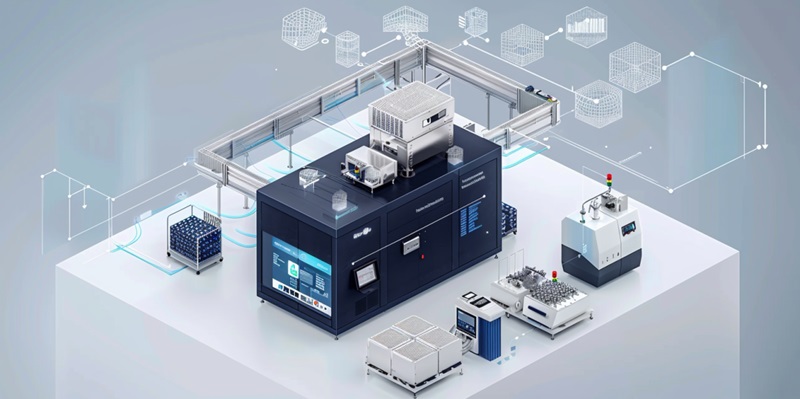The industrial realm is on the cusp of a dynamic shift, courtesy of the groundbreaking amalgamation of 5G and AI technologies. Leading the charge into this new era is a strategic alliance between Huawei Technologies, an ICT powerhouse, and Midea, a titan in electrical appliances. Together, these giants have inaugurated Southeast Asia’s first fully 5G-connected smart factory, symbolizing a monumental step towards Industry 4.0—the digitization of manufacturing. This article probes into the intricacies of this integrative technology and the profound impact it is wielding on the production landscape.
The Convergence of 5G and AI in Modern Manufacturing
The Strategic Alliance of Huawei and Midea
In the heart of Thailand’s Chonburi Industrial Park, a marvel of modern engineering hums with life—the result of the pioneering partnership between Huawei and Midea. This alliance is not merely a union of two corporate entities but a fusion of Huawei’s 5G expertise with Midea’s manufacturing innovation. Their collaborative ventures have catalyzed the digital transformation in manufacturing, offering a glimpse into the potential of a fully connected production environment.
The Impact of 5G on Industrial Connectivity
At the forefront lies 5G, the next-gen wireless technology famed for its blazing-fast speeds and ultra-reliable low-latency communication. In the context of manufacturing, 5G is the central nervous system, transmitting torrents of data at unprecedented speeds. This empowers real-time monitoring and sophisticated device analytics, catapulting operational efficiency to heights hitherto unattainable. 5G’s prowess is further borne out in its capability to facilitate a symbiotic network of automated guided vehicles, rendering material transportation within factories both seamless and safe.
Realizing the Potential of Smart Factories
Revolutionizing Production with AI Inspection Systems
AI’s transformative effect on the industry is showcased in systems where it oversees quality control with meticulous precision, enhancing both the product quality and production yield. This shift to AI-operated inspections has substantially diminished the need for rework, underscoring the efficiency and reliability of intelligent systems. As AI continues to advance, it’s poised to redefine the concept of the production line, injecting it with a dose of unprecedented accuracy and consistency.
Enhancing Worker Safety and Efficiency
Smart manufacturing also gravitates towards an increased cognizance of worker safety. AI and remote-controlled robotics have heralded a new age of industrial safety protocols, sharply reducing the incidence of work-related hazards. The integration of these technologies translates into an operational milieu where safety and efficiency coalesce, paving the way for a workforce that can perform tasks in tandem with sophisticated machinery without compromising on safety or productivity.
Economic Implications of Smart Manufacturing
Profits and Automation: The Midea Success Story
Midea’s ascent in the world of smart manufacturing stands as a testament to the commercial prospects inherent in the fusion of 5G and AI. Reaping more than a fivefold surge in net profits by 2022, the company’s story is emblematic of the financial boons associated with embracing high-tech manufacturing approaches. With an impressive leap from 30% to over 50% automation levels within a decade, Midea’s success narrative underscores the palpable economic benefits of digital transformation in manufacturing.
Global Market Projections and Trends
Foreseen as a burgeoning field, Fortune Business Insights projects the smart manufacturing market to burgeon from $310 billion in 2023 to an astonishing $745.1 billion by 2030. Asia-Pacific stands out as a hotspot for this exponential growth, spotlighting the global economic ramifications as industries worldwide pivot towards technologically advanced manufacturing frameworks.
The Future of Smart Factories
Global Initiatives and Industrial Transformation
Under the auspices of international cooperation, Huawei extends its reach through the Global Alliance of Artificial Intelligence for Industry and Manufacturing, a joint venture with UNIDO that underlines its dedication to accelerating industrial digital transformation. This initiative is a testament to Huawei’s commitment to fostering a global fabric of 5G and AI in manufacturing, elucidating a clear pathway to widespread adoption and international standardization.
The Evolutionary Leap in Manufacturing
The manufacturing industry stands on the brink of a transformative leap, propelled by the revolutionary fusion of 5G and AI technologies. At the forefront of this evolution are Huawei Technologies, an innovator in ICT, and Midea, a heavyweight in home appliances. Uniting their expertise, they’ve unveiled the first 5G-integrated smart factory in Southeast Asia, marking a significant milestone towards Industry 4.0—the transformation of manufacturing through digitization. This groundbreaking initiative not only underscores the combined potential of these technologies but also has a substantial effect on production methods and efficiency. As this article delves into the composite technologies at play and their significant consequences on manufacturing, it’s evident that the synergistic blend is reshaping the industrial arena, setting a new standard for smart, connected production facilities.

